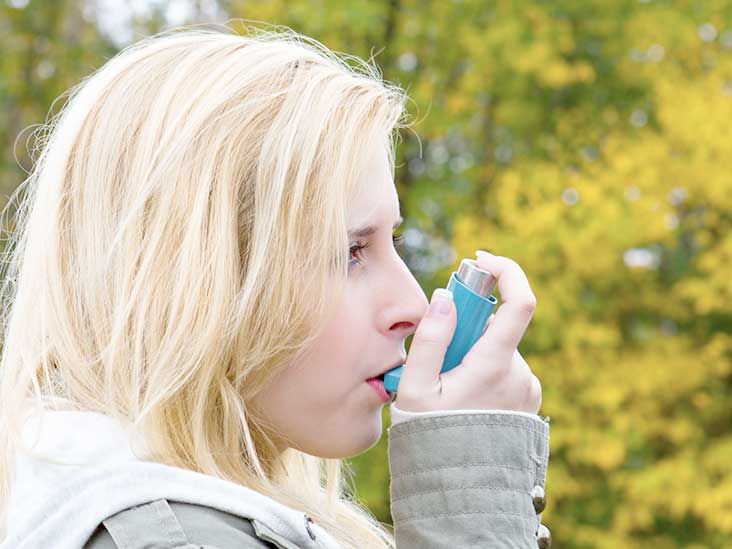If your inhaler stops working, other treatment options may help provide symptom relief or prevention. These may include oral medications, injections, and surgery, among others.
Several treatments are available to help you manage your asthma. The primary treatment method is inhalers, according to the National Health Service (NHS). These are designed to let you breathe in medication.
There are three types of inhalers:
- Rescue inhalers: These dispense a medication called a short-acting beta-agonist (SABA), which helps relieve or stop asthma attack symptoms by opening up your airways. They’re also called short-acting bronchodilators.
- Prevention inhalers: These help prevent asthma symptoms by dispensing a corticosteroid, which helps prevent inflammation to keep your airways open.
- Combination inhalers: These provide a combination of corticosteroids and a long-acting beta-agonist (LABA) to help relieve and prevent asthma symptoms.
Asthma doesn’t have a one-size-fits-all management approach. Some inhalers could stop working as they should. You may also find that what worked at one point no longer helps.
Here are some steps you can take to get started on a new path to successfully manage your asthma.
Call 911
If you or someone around you is experiencing symptoms of an asthma emergency:
- call 911 or your local emergency number
- go to the nearest emergency department
Keep a close eye on your asthma symptoms to determine if your current treatment plan no longer works. Speak with a healthcare professional about your treatment plan if you experience any of the following:
- symptoms that occur more regularly than before
- you have to use a rescue inhaler three or more times per week
- symptoms cause you to wake up at night
- you have to limit your daily activities because of the symptoms
- lung test readings are getting worse
- you frequently feel tired
- you have stress, anxiety, or depression
- you develop pneumonia or another lung condition
Many factors may trigger your asthma symptoms. Write down what could be aggravating your asthma, as well as changes to your sleep, symptoms, and peak flow meter measurements if you have to measure the air coming from your lungs. These can help you and your doctor formulate a new treatment plan.
A doctor may prescribe oral medications if your rescue, prevention, or combination inhaler(s) no longer provide(s) enough symptom relief or prevention.
Oral medications
The following oral medications may help you manage asthma symptoms. It’s important to note that these medications aren’t replacements for your inhalers, but additional therapies.
- Leukotriene receptor antagonists (LTRAs): The medications montelukast and zafirlukast may be prescribed to help prevent inflammation caused by an asthma trigger. They’re
not usedTrusted Source to provide immediate symptom relief. LTRAs should be taken as an addition to your preventer inhaler, according to Asthma and Lung UK. - Theophylline: This drug is called a bronchodilator because it helps open up your airways. Like LTRAs, these aren’t prescribed to provide symptom relief during an asthma attack.
- Corticosteroids: These may be prescribed for a short period to help relieve symptoms of an asthma attack. You may require long-term corticosteroids if your asthma is hard to manage or you’re waiting for other types of treatments.
It’s important to speak with a healthcare professional about any risk factors, drug combinations, and side effects of taking these oral medications.
Biologics
Biologics are medications that help prevent lung inflammation, control asthma symptoms, and minimize the use of steroids.
They work by targeting eosinophil cells in your body, according to Asthma and Lung UK. These white blood cells may cause severe inflammation during asthma attacks.
According to Asthma and Lung UK, six types of biologics have been approved by the Food and Drug Administration (FDA) to help treat asthma. These include:
- reslizumab (Cinqaero)
- mepolizumab (Nucala)
- omalizumab (Xolair)
- benralizumab (Fasenra)
- tezepelumab (Tezspire)
- dupilumab (Dupixent)
Biologics are typically given every 2–8 weeks, depending on the biologic. They can be administered by injection or intravenously.
Surgery
Bronchial thermoplasty surgery may help provide symptom relief for severe asthma. It works by reducing the muscles around your airways to help open up your lungs.
During the surgery, a doctor will insert a thin, heated tube down your throat to remove the excess muscle.
Avoiding triggers
One of the best ways to treat asthma is to avoid triggers that cause it. Asthma triggers may include:
- allergens like pollen, dust mites, pet dander, and mold
- irritants like smoke, chemicals, and pollution
- illnesses
- not taking prescribed medications
- cold and hot weather
- damp or humid conditions
- stress
- exercise
You may have regular appointments with your doctor if you have asthma.
During these appointments, it’s important to talk about issues you may be having with your inhaler, as well as symptoms you may be experiencing. This is where keeping track of your symptoms can help your doctor get a better image of your management plan.
A doctor may also perform a few breathing tests to measure your airways, such as a spirometry test. This test
If your doctor modifies your treatment plan, you may have questions or concerns. For example, these may be about:
- managing numerous medications
- budgeting for the costs of the treatment plan
- preparing for an asthma attack
Discuss these with your doctor at your appointment, and write down the details of your new treatment plan. This can make it easier to follow.
Remember, always contact your doctor if you’re confused about the new treatment plan. They can review what you need to do and answer any questions that come up once you begin.
What if asthma symptoms are not relieved by an inhaler?
Other treatment options for asthma may include medications that are delivered orally, intravenously, or by injection. Surgery may also be an option.
What asthma does not respond to inhalers?
Non-type 2 inflammation asthma is a type of severe asthma that doesn’t normally respond to treatment with inhalers, according to the American Lung Association.
Why is my asthma inhaler not puffing up?
Your asthma inhaler may not be puffing up medication for a few reasons, such as not shaking the inhaler before use, not cleaning it every week so that medication blocks it, or not using it properly.
Speak with a healthcare professional if your inhaler is still not working after cleaning it.
Inhalers are the primary and most common treatment for asthma. That said, your asthma may change over time, so your inhaler may stop helping you control your symptoms.
If this happens, speak with a healthcare professional. They can help develop a new management plan that’s right for you.









